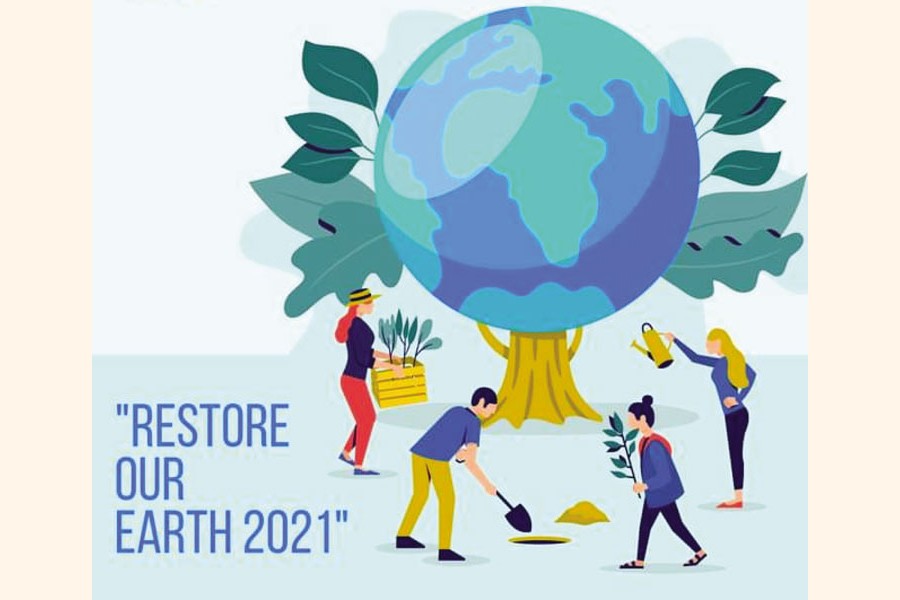Every year on April 22, Earth Day, the world's most prominent environmental movement, is observed in an effort to make people aware of the Earth's natural environment. Founded by former US Senator Gaylord Nelson, Earth Day was first observed in the year 1970 with the aim to promote the knowledge of ecology and raise mass awareness of the ever-growing concerns for air, soil, and water pollution. Recognised as the "International Mother Earth Day" by the United Nations, the Earth Day 2021 is going to be observed with the theme "Restore Our Earth."
The world commemorates this annual event to reflect on existing and imminent issues such as increasing environmental pollution, biodiversity loss, etc. Any change in our biodiversity affects the way the natural ecosystem functions and causes considerable disruptions to it. The United Nations states, "Despite ongoing efforts, biodiversity is deteriorating worldwide at rates unprecedented in human history. It is estimated that around one million animal and plant species are now threatened with extinction".
Outdoor activities by both activist groups and individual enthusiasts make the most of the Earth day celebration. Those activities include tree plantation, disposal of roadside trash, and motivational programmes on sustainable living with an emphasis on recycling materials. Some groups of people who take part in the celebration sign petitions with a view to urging governments to take pragmatic steps immediately to stop or slow global warming and reverse damages to the environment, thereby preventing climate change.
The theme has its basis on an emerging concept which dismisses the very idea that the human race can only save this planet by adapting or mitigating to the various impacts climate change as well as environmental damage has on us. Concerned parties including businesses, government and non-government organisations, scientists and researchers are now putting attention to the natural ecosystem along with emerging green and sustainable technologies to ensure the restoration of the ecosystem and forests, conservation of soil and its properties, improvement of eco-friendly farming practices, preservation of wildlife, and removal of plastics from the marine atmosphere.
During the period when we are waiting for our business and political leaders to formulate and implement decisive strategies to reduce harmful carbon emissions, soil conservation and reforestation along with other natural processes can help absorb a great amount of carbon and simultaneously restore biodiversity, rebalance our ecological systems, and improve the supply of pure air and water. Therefore, restoration of biodiversity is not only essential but also the demand of the time when it comes to reducing the impacts of climate change.
Restoration emerges as a hope amid the crises brought by COVID-19. This global pandemic has brought upon us several impacts which painfully clarify two interconnected crises such as the degradation of the global environment and its understandable connection to human health. Pollution of water and air, trafficking of wildlife, deforestation, climate change, our diets, and some other environmental issues have factored into the breakdown of the natural systems and processes, all leading to unprecedented and unforeseeable diseases like COVID-19 and a global economic meltdown.
Besides collapsing the world economy, this pandemic is the catalyst for painful loss of lives. Another existential threat to the existence of our civilisation is climate change. Both of these challenges have prevailed beyond national boundaries, and the community of scientists and researchers has been providing comprehensive suggestions and warnings for decades. The only way out of this situation is the restoration of ecosystems which is directly linked to our very existence and well-being.
Ten Simple Lifestyle Choices and Steps to Help Protect Our Earth:
- Reduction, Reuse, and Recycling: Try to use more of what is being thrown away. The three R's needs to be followed to ensure the conservation of landfill space and natural resources.
- Volunteering: Join hands in cleanups of waste in the community. Engage in activities to protect the watershed too.
- Education: Receive education on environmental well-being and sustainability and go out to help others realize their roles in using and preserving natural resources consciously.
- Conservation of Water: Use as less water as you can to reduce the amount of waste and runoff water going into the ocean.
- Sustainability: Adopt a lifestyle that depends on the smart choices of seafood.
- Thoughtful Shopping Behaviour: Buy and use reusable bags for shopping instead of relying on plastics.
- Use of Long-Lasting Electric Products (Bulbs): Use energy-efficient electric products and light bulbs to help reduce the emissions of greenhouse gas. Form the habit of turning off appliances and gadgets when not in use.
- Tree Plantation: Plant more trees as they provide our population with oxygen and food while helping clean the atmospheric air, combat global climate change, and save energy.
- Eco-Friendly Disposal Method: Avoid throwing away wastes and chemicals into the waterways. Practice using non-toxic products and chemicals both at home and at the workplace.
- Use of Energy-Efficient Vehicles: Try to bike more and drive less.
The idea that a healthy environment is a prerequisite to a healthy population is long overdue where scientists across the world have passed suggestive warnings of deadlier viruses that may arrive due to our failure to take the required care of the Earth.
Mahatma Gandhi once said, "Earth provides enough to satisfy every man's need, but not every man's greed". If the rate at which we are producing and consuming commodities without due regards to the nature is not decreased and the population reaches 9.6 billion by 2050, we will need two more planets besides the Earth to provide enough for the anticipated population. Therefore, we must consume resources without causing mass destruction to natural resources, abandon the greedy lifestyle, and live satisfactorily staying within the boundaries of the planet so that our race can shape a happy, healthy, prosperous, and sustainable tomorrow for the future generations.
Md. Touhidul Alam Khan is Additional Managing Director & Chief Risk Officer of Standard Bank Limited.


